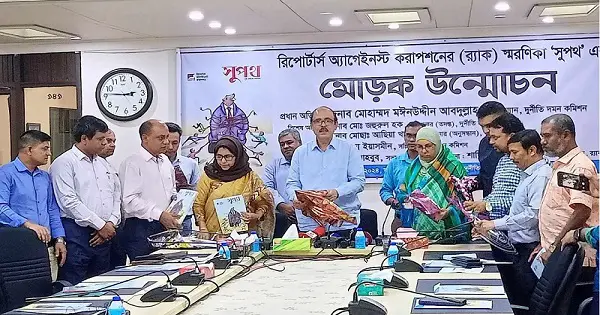Prime Minister Sheikh Hasina said that the importance of the language movement in the history of the liberation struggle of the Bengali nation is immense. It was through this movement that the foundation of a non-communal, democratic and language-based state system was laid.
He said, ‘Abul Barkat, Abdul Jabbar, Abdus Salam, Rafiquddin Ahmad, Shafiur Rahman and many others sacrificed their lives to protect the dignity of our mother tongue Bengali on this day in 1952. I pay deep respect to the memory of all language-martyrs of the world including Bengali. Along with this, we remember with utmost respect the greatest Bengali of all time, Father of the Nation Bangabandhu Sheikh Mujibur Rahman, who led the fight to establish the status of the Bengali language, and all the language soldiers, whose supreme sacrifice and struggle have raised the dignity of our mother, soil and people.
The Prime Minister said this in a message given on Tuesday (February 20) on the occasion of Great Martyrs’ Day and International Mother Language Day on Wednesday (February 21). This year’s theme of the day is ‘Education through Multilingualism: Pillar of Intergenerational Learning’
Sheikh Hasina said, the history of the glorious Bengali language movement from 1947 to 1952 has been serving as a source of inspiration in our national life for ages. The father of the nation was jailed several times while leading the language movement. On November 27, 1947, it was decided to make Urdu the state language of Pakistan at the Education Conference held in Karachi.
He said, as soon as the news reached Dhaka, the students of Dhaka University immediately protested in front of Khawaja Nazimuddin’s residence. Shortly after this, Sheikh Mujib, a student of Dhaka University’s law department, played a very important role in establishing the Chhatra League in Dhaka on January 4, 1948, using his organizational experience. In the first session of the Constituent Assembly on 23 February, Dhirendranath Dutta of Comilla moved an amendment demanding the inclusion of Bengali as a language of the Constituent Assembly.
Sheikh Hasina said, rejecting the proposal, Khwaja Nazimuddin announced in the Legislative Council that the people of East Bengal should accept Urdu as the state language. But in protest of Nazimuddin’s stubborn decision, the all-party Chhatra Sangram Parishad was formed in Dhaka University’s Fazlul Haque Hall on March 2, consisting of Chhatra League, Tamaddun Majlis and other parties.
He said many language soldiers including Sheikh Mujib were arrested in front of the secretariat while leading the March 11 strike and were released on March 15. Bangabandhu Sheikh Mujibur Rahman presided over the Amtala meeting of Dhaka University. Jinnah spoke in favor of Urdu at the Race Course Maidan in Dhaka on 21 March and students immediately protested when Urdu was announced as the state language of Pakistan at a convocation held at Curzon Hall on 24 March.
The Prime Minister said that to transform the language movement into a national movement, Sheikh Mujib made a nationwide tour schedule and participated in extensive campaigns and addressed meetings and gatherings. He was arrested from Faridpur on September 11, 1948 and released on January 21, 1949. He was arrested again on April 19 and released in July. Then he was arrested on October 14, 1949 and released on February 27, 1952.
He said that since January 1, 1950, Sheikh Mujib has established contact with Bhashasain and Chhatra League leaders from inside the Dhaka Central Jail and has given various suggestions and directions to speed up the movement. On February 3, 1952, he sent a message through three messengers – to call a nationwide strike on February 21. When Sheikh Mujib went on hunger strike on February 16, the prison authorities transferred him from Dhaka to Faridpur Jail.
Sheikh Hasina said, 21st February 1952 was scheduled for the budget session of the East-Bengal Management Council. According to the advice and instructions of Sheikh Mujib, a general strike was called across the country on that day. Students took out a procession in violation of Article 144 and when the police fired indiscriminately, many lives were lost instantly, many were injured, many were arrested. A strike was observed on 22 February.
He said, in 1956, Awami League formed the cabinet, gave Bengali the status of the state language, first declared 21st February as Martyrs’ Day, declared a public holiday on this day and took up the project of building Martyrs’ Minar. Unfortunately, with the imposition of martial law on October 7, 1958, those aspirations were no longer fulfilled.
The Prime Minister said that in independent Bangladesh, the Father of the Nation ordered the use of Bengali language in all official work. He made Bengali the state language in the constitution. By speaking at the 29th General Session of the United Nations in Bengal, he held our mother tongue in the seat of dignity in the world assembly.
He said that during the 1996-2001 period of the Awami League government, two Bangladeshi expatriates named Rafiq and Chalam formed the ‘Mother Language Preservation Committee’ together with some members of the international community. sent a resolution to the United Nations to celebrate 21 February as ‘International Mother Language Day’. On November 17, 1999, UNESCO recognized February 21 as ‘International Mother Language Day’
Sheikh Hasina said, we have established the International Mother Language Institute. We have taken initiatives to preserve the endangered languages of the world and protect their dignity. I have confirmed the use of Bengali language in IT. Since 2017, we have been distributing free textbooks in the mother tongue of the minority groups including Braille books for the visually impaired.
The Prime Minister said that Bengali nationalism was established through the great language movement and said that we have made Bangladesh a role model for development in the world in the last 15 years by embracing this Bengali nationalism and the ideals of Father of the Nation Bangabandhu Sheikh Mujibur Rahman.
With the collective efforts of all, we will be able to establish a developed, prosperous and self-respecting ‘Golden Bangladesh’ of the father of the nation’s dream, he said, adding that the Bangladesh of 2041 will be ‘Smart Bangladesh – which will be achieved through the creation of smart population, smart economy, smart government and smart social system. . Along with that we are implementing Bangladesh Delta Plan-2100.
Stating that UNESCO has been celebrating this day with due dignity since 2000 with Bangladesh, Prime Minister paid respect to the people of all languages and cultures of the world including Bengali on the occasion of Great Martyr’s Day and International Mother Language Day.




